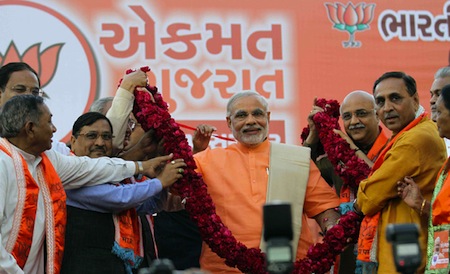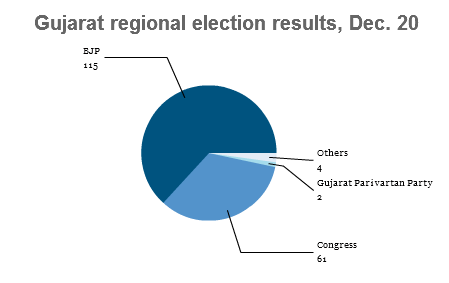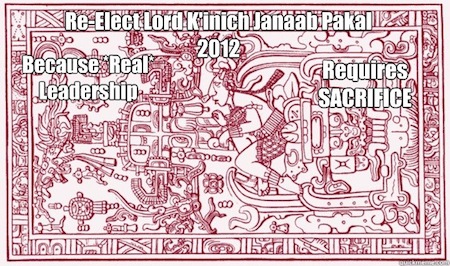Votes were counted yesterday from two regional state elections in India — in Gujarat, on the west-center coast of India, with 60 million people, and in the much smaller Himachal Pradesh, a much smaller Himalayan state that borders Tibet, with just six million people.![]()
But in some ways, December 20 was the first day of campaigning for the national election — likely to be held in 2014 — to control India’s Lok Sabha ( लोक सभा), the 552-member lower chamber of the Indian parliament.
The upshot of the elections is that Gujarat’s chief minister Narendra Modi (pictured above) has been reelected for a third consecutive term, and his victory has invariably made him the frontrunner to be the prime ministerial candidate of the Hindu nationalist and conservative Bharatiya Janata Party (the BJP, or भारतीय जनता पार्टी) in 2014, when the BJP hopes to national power for the first time since its stunning 2004 election loss.
Modi had done nothing to dispel the notion that he wants to become prime minister during the campaign, in which Modi, quite novelly in Indian politics (and to my knowledge, world politics), appeared simultaneously at rallies throughout the state using a hologram version of himself.
Even in his victory speech, when he addressed supporters not in the local language, Gujarati, but the more nationally recognized Hindi language, he seemed to indicate that he was turning his eyes toward a national audience.
Modi, if he does lead the BJP in 2014, will not face the current prime minister, Manmohan Singh, but likely Rahul Gandhi — the son of the Sonia Gandhi, the president of Singh’s Indian National Congress (Congress, or भारतीय राष्ट्रीय कांग्रेस) and of the late former prime minister Rajiv Gandhi, and also the grandson of the late former prime minister Indira Gandhi.
Although some other BJP chief ministers appear ready to back Modi, he still faces obstacles — 2014 is far away, and the BJP chief minister of Madhya Pradesh since 2005, Shivraj Singh Chauhan, who has also been a member of the Lok Sabha since 1991, will be seeking his third consecutive term next year. Madhya Pradesh lies in the heart of central India, with an even larger population (75 million) than Gujarat and which also has an economy better than India’s average.
Furthermore, Raman Singh, who has been the BJP chief minister of the less-populous (25 million) but industrially vital east-central state of Chhatisgarh since 2003, will also seek his third consecutive term in 2013.
At the national level, the chief minister of Bihar state, Nitish Kumar, remains decidedly cold about running with Modi in 2014. Kumar leads the Janata Dal (United) party (JDU), which holds just 20 seats in the Lok Sabha, but is the second-largest member, after the BJP, of the National Democratic Alliance in the Lok Sabha that stands as the united opposition to Congress. The JDU lies more to the political left of the BJP, and it’s been strongest in Bihar and Jharkhand in the far east of India. Kumar, whose party is also more secular than the Hindu-based BJP, has worked to appeal to Muslims, which comprise 16.5% of the population in Bihar. He has threatened to pull the JDU out of the alliance with the BJP if it nominates Modi as its prime ministerial candidate.
But for now, let’s take a closer look at the results, announced yesterday, in Gujarat:
Going into the election, the BJP controlled 117 of the 182 seats in the Gujarati regional parliament. Modi held onto most of those seats, despite a nationalized campaign that brought Singh and both Sonia and Rahul Gandhi to campaign against him, and despite rumblings from elements within Gujarat to Modi’s right and Keshubhai Patel, who preceded Modi, serving in 1995 and from 1998 to 2001. Patel formed a new party, the Gujarat Parivartan Party (GPP), which won two seats, and likely stole away enough votes from Modi’s BJP to allow Congress to win a few more seats in the election.
Although Modi would probably have liked a wider victory — expectations spun wildly out of hand that he could win 130 to 150 seats, although that was never incredibly likely — it’s nonetheless a very strong win after more than a decade of incumbency for Modi personally and two decades of incumbency for the BJP, especially in a country that isn’t incredibly kind, electorally speaking, to incumbents (as the BJP learned yesterday in Himachal Pradesh). Continue reading Modi’s Gujarat victory sets platform for national ambitions in 2014




